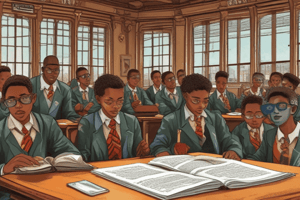Podcast
Questions and Answers
What is the main objective of the National Education Policy Act?
What is the main objective of the National Education Policy Act?
- To restrict the implementation of education policy
- To limit the power of education stakeholders
- To promote the interests of the Minister of Basic Education
- To facilitate the democratic transformation of the national system of education (correct)
What is the role of the Minister of Basic Education in determining national education policy?
What is the role of the Minister of Basic Education in determining national education policy?
- To only establish education institutions
- To determine national education policy and ensure its implementation (correct)
- To consult with stakeholders but not determine policy
- To only evaluate and monitor education policy
What is an example of an area where the Minister may determine national policy?
What is an example of an area where the Minister may determine national policy?
- Determining school holidays
- Education management information systems (correct)
- Employing educators
- Establishing education institutions
What is a principle that national education policy must be directed towards?
What is a principle that national education policy must be directed towards?
What is an example of a right that national education policy must protect?
What is an example of a right that national education policy must protect?
What is an area where the Minister may determine national policy for curriculum development?
What is an area where the Minister may determine national policy for curriculum development?
What is a goal that national education policy must enable the education system to achieve?
What is a goal that national education policy must enable the education system to achieve?
What is an example of a national policy that the Minister may determine for educator accreditation?
What is an example of a national policy that the Minister may determine for educator accreditation?
What is the primary focus of the National Policy on Religion in Education?
What is the primary focus of the National Policy on Religion in Education?
What is the primary focus of Religion Education in South Africa?
What is the primary focus of Religion Education in South Africa?
What is the main goal of the National Policy on an Equitable Provision of an Enabling School Physical Teaching and Learning Environment?
What is the main goal of the National Policy on an Equitable Provision of an Enabling School Physical Teaching and Learning Environment?
What is the responsibility of schools in regards to Religion Education?
What is the responsibility of schools in regards to Religion Education?
Which of the following is NOT a model of structuring the relationship between religion and the state considered in the National Policy on Religion and Education?
Which of the following is NOT a model of structuring the relationship between religion and the state considered in the National Policy on Religion and Education?
What is the purpose of the Policy on Learner Attendance?
What is the purpose of the Policy on Learner Attendance?
Who is qualified to teach Religion Education?
Who is qualified to teach Religion Education?
What is the purpose of guest facilitators from religious organisations?
What is the purpose of guest facilitators from religious organisations?
What is the main principle underlying the National Policy on Religion in Education?
What is the main principle underlying the National Policy on Religion in Education?
Which of the following is a national policy that has been published?
Which of the following is a national policy that has been published?
What is the primary goal of Religious Instruction?
What is the primary goal of Religious Instruction?
What is the primary goal of the Policy for Determining the School Calendar?
What is the primary goal of the Policy for Determining the School Calendar?
Who is responsible for Religious Instruction?
Who is responsible for Religious Instruction?
What is the characteristic of a theocratic model of structuring the relationship between religion and the state?
What is the characteristic of a theocratic model of structuring the relationship between religion and the state?
What is the relationship between Religion Education and other learning areas?
What is the relationship between Religion Education and other learning areas?
What is the importance of an appropriately trained professional educator in teaching Religion Education?
What is the importance of an appropriately trained professional educator in teaching Religion Education?
What is the primary objective of ensuring equitable education opportunities?
What is the primary objective of ensuring equitable education opportunities?
Who is the Chairperson of the Council of Education Ministers (CEM)?
Who is the Chairperson of the Council of Education Ministers (CEM)?
Who does the Minister consult with when determining policy involving state spending?
Who does the Minister consult with when determining policy involving state spending?
What is the timeframe for the Minister to give notice in the Government Gazette after determining policy?
What is the timeframe for the Minister to give notice in the Government Gazette after determining policy?
What is the purpose of the Council of Education Ministers?
What is the purpose of the Council of Education Ministers?
What is the consequence of denying an individual an education due to physical disability?
What is the consequence of denying an individual an education due to physical disability?
What is the role of the Minister in determining national education policy?
What is the role of the Minister in determining national education policy?
Where is the policy instrument made available after the Minister gives notice in the Government Gazette?
Where is the policy instrument made available after the Minister gives notice in the Government Gazette?
What is the primary consideration when organizing religious observances in a school?
What is the primary consideration when organizing religious observances in a school?
What is the purpose of the policy on religious observances in schools?
What is the purpose of the policy on religious observances in schools?
Why is it important to consider the impact of peer pressure on children when segregating pupils for religious observances?
Why is it important to consider the impact of peer pressure on children when segregating pupils for religious observances?
What is one way to ensure equitable opportunities for observance in a school?
What is one way to ensure equitable opportunities for observance in a school?
What is the role of schools in promoting religious education?
What is the role of schools in promoting religious education?
What is the importance of accommodating secular or humanist beliefs in religious observances?
What is the importance of accommodating secular or humanist beliefs in religious observances?
What is one way to ensure that pupils are not excluded from religious observances?
What is one way to ensure that pupils are not excluded from religious observances?
What is the goal of promoting unity in diversity in schools?
What is the goal of promoting unity in diversity in schools?
What is the primary focus of the National Policy on Religion in Education?
What is the primary focus of the National Policy on Religion in Education?
What is the significance of the Cooperative Model in the National Policy on Religion and Education?
What is the significance of the Cooperative Model in the National Policy on Religion and Education?
What is the goal of the National Policy on an Equitable Provision of an Enabling School Physical Teaching and Learning Environment?
What is the goal of the National Policy on an Equitable Provision of an Enabling School Physical Teaching and Learning Environment?
What is the role of the Minister in determining national education policy?
What is the role of the Minister in determining national education policy?
What is the significance of the National Policy on Learner Attendance?
What is the significance of the National Policy on Learner Attendance?
What is the primary consideration when organizing religious observances in a school?
What is the primary consideration when organizing religious observances in a school?
What is the goal of promoting unity in diversity in schools?
What is the goal of promoting unity in diversity in schools?
According to the cooperative model, what is established by the Constitution?
According to the cooperative model, what is established by the Constitution?
What is the primary focus of the policy on religion in education?
What is the primary focus of the policy on religion in education?
What is a key principle underlying the National Policy on Religion in Education?
What is a key principle underlying the National Policy on Religion in Education?
What is the purpose of ensuring equitable education opportunities?
What is the purpose of ensuring equitable education opportunities?
What is a key value underlying the policy on religion in education?
What is a key value underlying the policy on religion in education?
What is the primary goal of the cooperative model in the context of religion and education?
What is the primary goal of the cooperative model in the context of religion and education?
What is the significance of the Constitution in the context of religion and education?
What is the significance of the Constitution in the context of religion and education?
What is a key characteristic of the cooperative model?
What is a key characteristic of the cooperative model?
What is a key principle underlying the policy on religion in education?
What is a key principle underlying the policy on religion in education?
What is the primary goal of Religion Education in South Africa?
What is the primary goal of Religion Education in South Africa?
Who is responsible for teaching Religion Education?
Who is responsible for teaching Religion Education?
What is the purpose of guest facilitators from religious organisations?
What is the purpose of guest facilitators from religious organisations?
What is the primary goal of Religious Instruction?
What is the primary goal of Religious Instruction?
What is the responsibility of schools regarding Religion Education?
What is the responsibility of schools regarding Religion Education?
What is the relationship between Religion Education and other learning areas?
What is the relationship between Religion Education and other learning areas?
What is the purpose of Religious Observance?
What is the purpose of Religious Observance?
What is the primary consideration when organizing religious observances in a school?
What is the primary consideration when organizing religious observances in a school?
What is the purpose of religious observances in schools?
What is the purpose of religious observances in schools?
Why is it important to consider the impact of peer pressure on children when segregating pupils for religious observances?
Why is it important to consider the impact of peer pressure on children when segregating pupils for religious observances?
What is one way to ensure equitable opportunities for observance in a school?
What is one way to ensure equitable opportunities for observance in a school?
What is the goal of promoting unity in diversity in schools?
What is the goal of promoting unity in diversity in schools?
What is the importance of accommodating secular or humanist beliefs in religious observances?
What is the importance of accommodating secular or humanist beliefs in religious observances?
What is one way to ensure that pupils are not excluded from religious observances?
What is one way to ensure that pupils are not excluded from religious observances?
Flashcards are hidden until you start studying
Study Notes
National Education Policy Act (NEPA)
- Preamble: Adopt legislation to facilitate democratic transformation of national education system, serving the needs and interests of all South Africans and upholding their fundamental rights.
Objectives (Section 2)
- Gives the Minister of Basic Education the power to:
- Determine national education policy
- Consult with stakeholder bodies prior to determining policy
- Ensure publication and implementation of national education policy
- Ensure evaluation and monitoring of education policy
Minister's Powers (Subsection 3(4))
- The Minister may determine national policies for:
- Education management information systems
- Organisation, management, and governance of national education system
- Facilities, finance, and development plans for education
- Innovation, research, and development
- Ratio between educators and students
- Professional education and accreditation of educators
- Organisation, management, governance, funding, establishment, and registration of education institutions
- Compulsory school education
- Admission of students to education institutions
- Dates of school terms
- Hours per day and days per year in which education shall be provided
- Curriculum frameworks, core syllabuses, education programs, learning standards, exams, and certification of qualifications
- Language in education
- Control and discipline of learners at education institutions
- Education support services
- Co-operation between the DBE and other stakeholders
- International relations and executive functions required to implement national education policy
Directive Principles of National Education Policy (Section 4)
- National policies must be directed towards:
- Advancement and protection of fundamental rights guaranteed in the Bill of Rights and international conventions
- Protection against unfair discrimination within or by an education department or institution
- Right to basic education and equal access to education institutions
- Right of a parent or guardian in respect of the education of their child or ward
- Right of every child in respect of their education
- Right to be instructed in the language of their choice where reasonably practicable
- Freedom of conscience, religion, thought, belief, opinion, expression, and association within education institutions
- Establishment of education institutions based on a common language, culture, or religion
- Use of language and participation in cultural life within an education institution
Further Directives
- Policy must enable the education system to contribute to the full personal development of each learner and the moral, social, cultural, political, and economic development of the nation at large
- Advance democracy, human rights, and the peaceful resolution of disputes
Examples of National Policies
- National Policy on an Equitable Provision of an Enabling School Physical Teaching and Learning Environment
- Policy on Learner Attendance
- Policy for Determining the School Calendar
- Policy on the Organisation, Roles, and Responsibilities of Education Districts
National Policy on Religion in Education
- Minister's foreword: Ensuring unity of purpose and spirit that recognises and celebrates diversity in public schools
- Policy considers four possible models of structuring the relationship between religion and the state:
- Theocratic model
- Repressionist model
- Separationist Model
- Cooperative Model
Religion Education
- A curricular programme with clear and age-appropriate educational aims and objectives for teaching and learning about religion, religions, and religious diversity
- Study of religion must serve recognisable educational goals consistent with the aims and outcomes of other learning areas
- Schools are responsible for Religion Education, and should not promote one single religion but pursue a balanced approach to learning about religion
- Teachers should be appropriately trained professional educators registered with the South African Council of Educators (SACE)
Religious Instruction
- Information on a particular faith or belief, with the purpose of deepening an understanding and adherence to that faith or belief
- Responsibility of the home, family, and religious community
Religious Observance
- A period of time set aside for learners to engage in religious activities or reflections
- Should accommodate and reflect the multi-religious nature of the country in an appropriate manner
National Policy on Religion and Education
- The policy aims to support unity without uniformity and diversity without divisiveness in public schools.
Religion Education
- A curricular programme with clear and age-appropriate educational aims and objectives, focusing on teaching and learning about religion, religions, and religious diversity.
- The study of religion must serve recognizable educational goals, consistent with the aims and outcomes of other learning areas.
- Schools are responsible for Religion Education, promoting a balanced approach to learning about religion, without promoting one single religion.
Who Should Teach Religion Education?
- An appropriately trained professional educator registered with the South African Council of Educators (SACE).
- Representatives of religious organisations registered with SACE.
- Occasional guest facilitators from various religions, used on an equitable basis, under the authority of the teacher.
Religious Instruction
- Information on a particular faith or belief, aiming to deepen understanding and adherence to that faith or belief.
- The responsibility of the home, family, and the religious community.
Religious Observance
- An event held at a time determined by the school, accommodating and reflecting the multi-religious nature of the country.
- Examples of equitable arrangements include:
- Separation of learners according to religion, with equitably supported opportunities for observance by all faiths.
- Rotation of opportunities for observance, proportionate to the representation of different religions in the school.
- Selected readings from various religious texts.
- A universal prayer or period of silence.
Policy Approach
- The policy is designed to promote unity, diversity, and respect for all religions, without establishing the uniformity of religious education in a single faith.
- The policy does not discriminate against anyone, respecting the importance of the study of religion and religious observances.
Models of Structuring the Relationship between Religion and the State
- Theocratic model: the state identifies with one particular religion or religious grouping.
- Repressionist model: the state acts to suppress religion.
- Separationist model: the secular state attempts to completely divorce the religious and secular spheres.
- Cooperative model: combines constitutional separation and mutual recognition, establishing separate spheres for religion and the state, with scope for interaction.
DBE's Approach
- The cooperative model provides a framework that is best for religion and best for education in a democratic South Africa.
Values Underpinning the Policy
- Constitutional values of citizenship, human rights, equality, freedom from discrimination, and freedom for conscience, religion, thought, belief, and opinion.
Studying That Suits You
Use AI to generate personalized quizzes and flashcards to suit your learning preferences.




